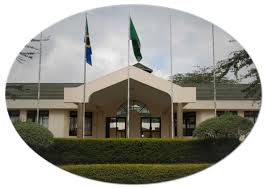The following post appeared as a guest post on Opinio Juris last week here. This is a cross-post, so whilst I’ve lightly edited some of the names, statutes etc to fit in with our house style, if you have already read the Opinio Juris piece you won’t find anything new here, but I thought some readers may have missed it. Enjoy!
Following moves from Gambia, Burundi and South Africa in the past weeks to withdraw from the ICC, much thought is now being given, and keyboards worn down, by the international community as it considers what this news will mean for these countries individually, Africa more generally and of course the ICC.
I want to slightly side-step some of these issues though and address the seemingly confused narrative circulating on the African alternative to the ICC. This seems especially important given the South African Minister for Justice Michael Masutha’s first statement on South Africa’s withdrawal from the ICC which reportedly included the line:
“South Africa will work closely with the African Union and with other countries in Africa to strengthen continental bodies, such as the African Court on Human and People’s Rights, created to deal with such crimes and to prosecute the perpetrators, whilst at the same time continuing to participate and honour its commitments under international human rights instruments.”
Let’s be clear, the African Court does not and will not, barring an extraordinary turn of events, ever have the jurisdiction to try cases of genocide, crimes against humanity and war crimes. The African Court is a human rights court, similar in many ways to its European and Inter-American cousins. It has jurisdiction to consider alleged violations of the African Charter and other international human rights instruments to which the member state in question has signed up to, but nothing in the African Court’s statute, Protocol or Rules gives the African Court the power to prosecute individuals for crimes such as genocide, crimes against humanity and war crimes. To point to the African Court as an alternative to the ICC is like Germany or France withdrawing from the ICC and then pointing to the European Court of Human Rights to handle things from now on.

There is another possibility for AU member states though on the horizon and one that not only has the same jurisdiction as the ICC but actually one much greater; the African Court of Justice and Human Rights (ACJHR). At present however this court exists on paper only in the form of the Protocol on the Statue of the African Court of Justice and Human Rights and the subsequent 2014 Draft Protocol on Amendments to the Protocol on the Statute of the African Court of Justice and Human Rights. Read through this second Draft Protocol and there emerges details of a mega-court that would subsume the current African Court on Human and Peoples’ Right which would then exist as a “Human and Peoples’ Rights Section”, alongside a “General Affairs” section and an “International Criminal Law” section. The International Criminal Law section would have three chambers, a Pre-Trial Chamber, a Trial Chamber and an Appellate Chamber and have jurisdiction to try individuals on charges of genocide, crimes against humanity and war crimes. Sound familiar?

There are however a number of differences between the ICC and the International Criminal Law Section of the ACJHR. To start with, in addition to genocide, crimes against humanity and war crimes, the ACJHR would have jurisdiction over a further 11 crimes including corruption, mercenarism and the trafficking in persons and drugs, creating an ambitious roster of 14 crimes under its jurisdiction (Article 28A, Draft Protocol). Additionally, the International Criminal Law Section of the ACJHR would include immunity from prosecution for serving AU heads of state or government and other “senior state officials” whilst in office- a vague definition if there ever was one (Article 46A bis, Draft Protocol). But above concerns over immunity and jurisdiction exists the real kicker; to take the ACJHR off the page and into reality requires at least 15 AU member states to ratify the amended Protocol (Article 11, Draft Protocol). Currently however, not a single AU member state has ratified the Draft Protocol and its international criminal law section- not one. This complete lack of ratification goes some way to demonstrate the clear gap that exists between those advocating for withdrawal from the ICC ostensibly to allow the AU to handle matters, and those who have actually signed up to the AU’s alternative.
So as Gambians, Burundians, South Africans and the wider world starts to come to grips with what withdrawal from the ICC could mean, let’s be clear on the regional alternative – the African Court of Justice and Human Rights and where it currently exists- on paper only.
